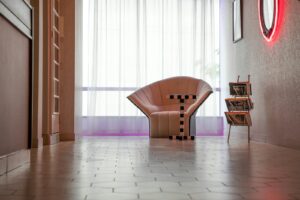Cork flooring is not waterproof. While cork has natural water-resistant properties, it is not entirely impervious to water. It is advisable to avoid prolonged exposure to moisture and to promptly clean up spills to maintain the longevity and appearance of cork flooring.
Cork flooring is gaining popularity as a sustainable and comfortable option for homes. As consumers explore flooring choices, it’s crucial to understand the characteristics of cork, particularly its water resistance. This article aims to clarify whether cork flooring is truly waterproof and provide insights into its composition, care, and considerations for potential buyers.
Is Cork Flooring Waterproof?
Cork possesses natural water-resistant properties due to its cellular structure, which contains a waxy substance known as suberin. While cork can withstand some moisture, it is essential to dispel the misconception that it is entirely waterproof. Clearing up this misunderstanding is vital for consumers seeking accurate information about cork flooring.

Cork Flooring Composition
Cork, derived from the bark of cork oak trees, is a renewable and eco-friendly material. The composition of cork includes millions of tiny air-filled cells, making it lightweight and providing insulation. However, the presence of these cells also influences cork’s water resistance, making it imperative to understand the material’s composition.
Water Resistance vs. Waterproof
Cork flooring’s inherent water resistance is attributed to the presence of suberin, a natural substance found in its cellular structure. Suberin acts as a barrier against moisture, making cork an excellent choice for areas with occasional spills or humidity.
While cork can repel water to a certain extent, it is crucial to recognize that it is not impervious to prolonged exposure or standing water. The term “water-resistant” implies a level of protection, but it falls short of being completely waterproof.
Consumers should be aware that while cork can handle minor spills and humidity, it is not suitable for areas prone to constant water exposure, such as bathrooms or wet basements.
Clarifying the distinction between water-resistant and waterproof helps set realistic expectations for cork flooring performance. Educating consumers ensures they make informed decisions based on their specific needs and circumstances.
While cork’s water resistance provides a level of protection, maintaining its integrity requires proactive care. Regular cleaning with a damp mop helps remove dirt and prevents the accumulation of moisture.
The key to preserving cork’s water resistance lies in swift spill cleanup. Wiping away spills immediately prevents liquids from penetrating the material and causing potential damage.
Understanding the distinction between water-resistant and waterproofing is crucial when deciding where to install cork flooring. Areas with minimal water exposure or controlled humidity levels are ideal, while high-moisture environments may necessitate alternative flooring solutions.
Seeking advice from flooring professionals can provide valuable insights tailored to specific environments. Professionals can assess individual needs and recommend the most suitable flooring options for various spaces within a home.
Conclusion
In conclusion, cork flooring’s water resistance is a valuable characteristic, but it is not entirely waterproof. Armed with accurate information about cork’s composition, care practices, and considerations for usage, consumers can confidently decide whether cork flooring aligns with their needs. Empowering individuals with knowledge promotes informed choices and enhances the overall satisfaction of homeownership.
Read More




